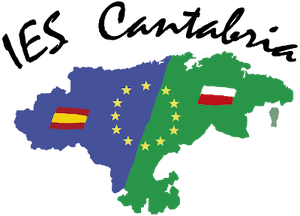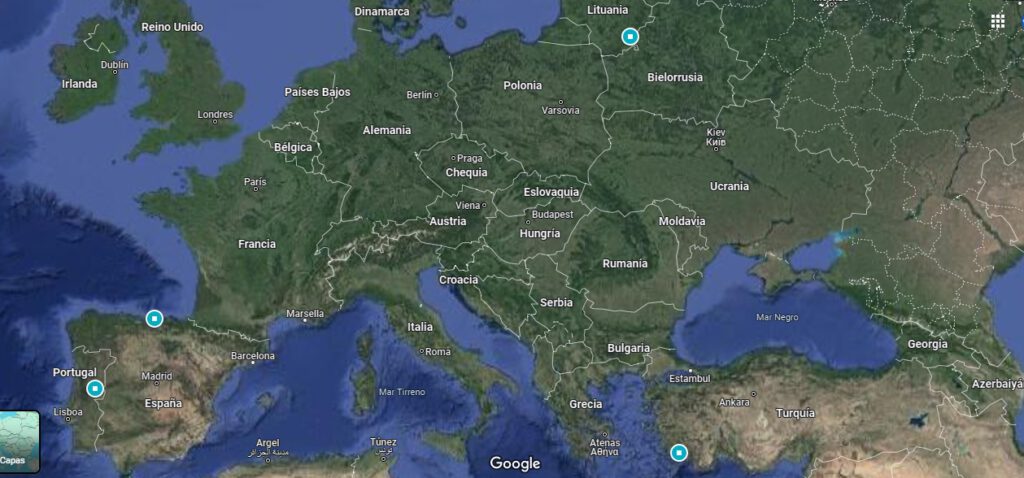Erasmus+ EcoConnect. Fostering EcoLiteracy for a Sustainable Future.
IES Cantabria
Project n° 2023-2-PT01-K210-SCH-000174266
Our school. Presentation:
The IES CANTABRIA is an educational centre which started its activity back in the 90s as a Vocational Training and Secondary & Bachillerato School (Pre-university level) and it is located within the urban area of Santander (https://goo.gl/maps/6BvHXNKmGHMigErx7), a small town on the north coast of Spain: http://en.wikipedia.org/wiki/Santander,_Spain
Our school is a medium-size institution with 1300 students and 118 teachers currently working on the different fields which develop the national curriculum for Secondary Education and specialized courses in the Health and Chemistry fields, as well as different actions aimed at engaging the students’ interests for further education. One of the identity marks of the school is trying to cope with individualised learning. Since 1996, the school has become an outstanding reference in different fields meeting the challenges of education according to the circumstances and it is the only one developing the British Council-Ministry Ed. Bilingual programme.
During the years of compulsory education (ESO), special measures are implemented in order to attain students with Special Needs, Literacy, Bilingualism or those taking part in the Diversified curricula. At the Advanced Levels (Bachillerato), our school offers a wide variety of subjects and professional marketable skills for pupils: Social Sciences and Humanities and Sciences.
Some School Resources: Plans, projects and programmes
There is a library with more than 5000 books and computers with Internet access which can be visited by students and teachers.
A gym and two courts are some of the sports facilities for the students located within the school area which also has gardened surroundings.
ICT is present in most of the classrooms and Internet Wi-Fi access is provided in the main building.
At IES Cantabria Secondary School, there are also specific projects and plans such as Reinforcement, Sustainability, Health Education, Entrepreneurship, European Programmes (eTwinning/Erasmus) Languages and ICT which are jointly developed during the 6 years-stay of pupils aged 12 to 18.
The European dimension and internationalization is a key aspect yet to come, as we are open to collaboration with international partners from other European countries to exchange best practices and develop innovative digital competency and ICT training programmes, methodologies and materials adapted from existing programmes offered at educational institutions around Europe.
EcoConnect Erasmus+ Project:
The global community is confronted with an unparalleled crisis: the climate emergency. Unlike other challenges, this crisis knows no borders or generational divides; it affects all of humanity. Climate change is a pressing issue that doesn’t just impact our future; it’s altering our present and endangering the delicate equilibrium of our planet. Our mission is to equip students with ecological literacy, a vital skillset for understanding and addressing these complex environmental issues. This project is SMART because it has Specific goals focused on ecological education, Measurable outcomes such as ecoliteracy and digital outputs, Achievable through planned activities and collaborations, Relevant to environmental concerns and Sustainable development, and Time-bound with clear deadlines for activities and reporting, ensuring effective implementation and impact.
Eco-Literacy: Learning scenarios and aims:
Our project has many goals:
-
Output 1: «EcoTech Pedagogy: Preparation of Ecology Learning Scenarios with Web2.0 Tools», which will reveal practical approaches to integrating nature-based learning into the curriculum.
- Output 2: An Ecology Animation Game, an educational tool that teaches the basics through interactive play
- Outcome 3: “STEM Enrichment : A Journey through 5E Learning Scenarios” featuring innovative teaching methodologies
- Output 4: “EcoConnect: Mapping Green Friendship Ties” to visualize the connections between individuals, communities and nature
- Output 5: Zero Waste Recipes e-book that promotes sustainability through practical solutions

Our Erasmus+ project is called “Eco-Connect”.
Digital Fluency: Participants develop both digital competence and ecological literacy by navigating digital tools that are crucial in today’s world
Dynamic Curriculum: Eco-literacy combines seamlessly with the innovative 5E-STEM model, revolutionizing curriculum design for experiential, real-world learning
International Cooperation: Cross-border organizations work collaboratively to foster international friendship and cultural appreciation Aligned with its priority areas, this project goes beyond traditional learning and pioneers innovative approaches that create a transformative and lasting impact.
With the 5E-STEM model, we bring together nature, digital tools and comprehensive resources for an enriching educational journey
Escola Secundária Campos de Melo, Covilha:
Mobility Activity: EcoTechPedagogy: Empowering Students and Teachers for Innovative Ecology Education with Web2.0 Tools. Output 4: «EcoConnect: Mapping Green Friendship Ties:»
IES «Cantabria», Santander:
Mobility Activity: Sustainable Food Practices Workshop. Output 5: Zero Waste Recipes-book that promotes sustainability.
Şehit Mehmet Çetin A.I.H.L.:
Mobility Activity: AquaEcology: Nurturing Environmental Stewards through Water Education. Output 3 – STEM Enrichment: A Journey through 5E-Learning Scenarios» featuring innovative teaching.
Asociacija TAVO Europa:
Mobility Activity: «ECO-STEM Teacher Workshop» Virtual Event: Ecology Relationship with SDG Goals. Virtual Event Understanding Ecology and Animation. Output 1: «EcoTech Pedagogy: Crafting EcologyLearning Scenarios with Web2.0 Tools» (5 scenarios – 2 scenarios for each partner). Output 2: EcologyAnimation Game: an educational tool that teaches the basics through interactive play.

